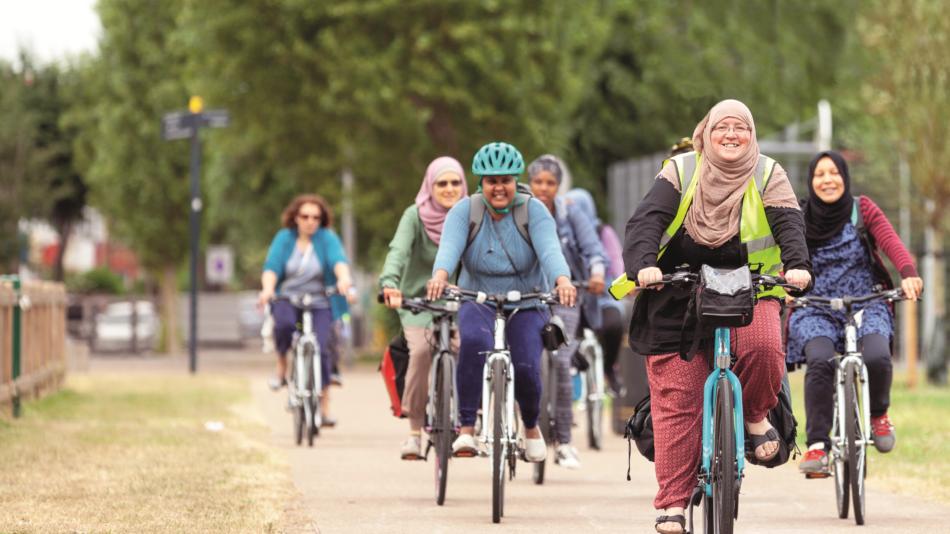

LCC is due to do a ward by ward analysis of areas where active travel could have been a vote winning or losing issue in the 2022 London local elections, as soon as it can, but on an initial look at the borough level, it’s fairly clear that progressive policies on active travel and climate action win votes, while opposition to cycle tracks and Low Traffic Neighbourhoods (LTNs) lose votes in general.
Leaders of the party that won the election and elected Mayors in the following 14 boroughs committed to achieving the Climate Safe Streets changes asked of them by their local LCC group:
On top of that, Cllr Simon Hogg, new Labour leader of Wandsworth gave a statement saying: “Wandsworth Labour will make cycling easier and safer”. And Cllr Jas Athwal, returning Labour leader of Redbridge also gave a statement saying “I want to see more people have greater access to cycling (whether that’s through cycle storage schemes or improved cycle lanes) and feel safe about cycling around our borough.”
Candidates for leader who also are now the main opposition force in the borough also committed to the asks, and we will be working to ensure they hold the parties in power to account on cycling and climate action. Green candidates committed to our campaign in nearly every borough and these are the primary opposition parties committed to their borough’s Climate Safe Streets campaign asks, where the party in power did not commit:
(For more on what we did during the Climate Safe Streets campaign and what that resulted in, click here.)
Cycling, active travel, climate should not be, and often isn’t a party political issue – it’s important to underline that. LCC works with every major party in every borough in London, and there are compelling reasons why all parties should work on these issues.
There are also clear reasons why national issues such as the war in Ukraine, ‘Partygate’ and the cost of living crisis might have been more front of mind in the polling booth than LTNs or cycle hangars. But despite the difficulty of reading the tealeaves of election results, here’s our initial analysis:
The most notable example of an anti-active travel candidate beating those delivering walking and cycling schemes is Aspire taking Tower Hamlets from Labour, with Mayor Lutfur Rahman unseating previous Mayor John Biggs.
Rahman’s 8 point manifesto/plan for the borough includes removing all LTNs and he’s already said this is his first priority, telling ITV “Our roads have been closed, blocked up…. we’re going to consult and reopen our roads.” However, while such statements are clearly worrying for action on active travel and climate in Tower Hamlets, it is unlikely Rahman’s re-election was primarily about active travel.
Rahman was removed from office and banned from holding office for five years in 2014. This is the first local election following his ban lifting and he had won two terms in a row prior to the ban and being found guilty, with his agents, of corrupt and illegal practices. Rahman has remained popular, clearly, in Tower Hamlets despite the verdict against him, and there has also been widespread anger with the local Labour Party over a variety of issues beyond modal filtering. It is likely that in the borough, while there is a clear anger in some quarters about LTNs, Rahman’s return is primarily down to his base still supporting him.
On top of that, previous Labour Mayor Biggs had already weakened, removed and ‘paused’ a series of active travel schemes in Tower Hamlets and sent a clear message to the electorate that not only was he rattled by an Aspire by-election win, but also weak on active travel in general. In other words, a vote for Labour/Biggs was no more a vote for active travel in these circumstances than a vote for Aspire/Rahman was specifically against.
Two further boroughs that switched hands bear consideration. In Croydon, new Labour Mayoral candidate Val Shawcross (an ex-Transport Deputy Mayor to Sadiq Khan) was beaten by Conservative Jason Perry – but with neither strongly pushing transport, it seems likely any issues around active travel were not at the foreground, particularly given the previous Labour administration had publicly brought the council to the brink of bankruptcy.
Similarly, in Harrow, Labour lost to Conservatives, but this, particularly given it was Labour that put in weak active travel schemes and then pulled them out, doesn’t seem to be primarily about active travel – so much as perceived incompetence and high-rise development possibly. Certainly, directly anti-LTN candidates didn’t do well there. And the new Conservative administration in Harrow may be more positive on active travel than some assume.
It has been widely reported that in Enfield, site of ongoing controversy around two LTNs, that Labour lost eight seats to anti-LTN Conservatives. But the picture is quite a bit more complex. Labour went in to the 2022 election with 38 seats and came out with the same number. The Conservatives have taken seats from independent, Green and Lib/Dem councillors, some of whom had left Labour after the 2018 elections. The wards most impacted by the two LTNs remained Labour, and most of the shift towards Conservatives appears to be in areas where ‘green belt’ development was more likely the most pressing issue.
From assessing all of these, and looking at polling, it certainly does seem like Londoners broadly have voted for councillors who are keen on tackling the climate crisis and enabling more active travel; and even where ‘controversial’ schemes have been attacked directly, voting patterns don’t indicate anti-LTN or anti-cycling sentiment has driven voting. If anything, an argument could well be made that where anti active travel candidates triumphed it was against candidates who themselves had not fully embraced active travel and climate action – who failed to put out a strong case for action on these issues distinctly from their opposition. But further analysis of these issues is required and coming soon…